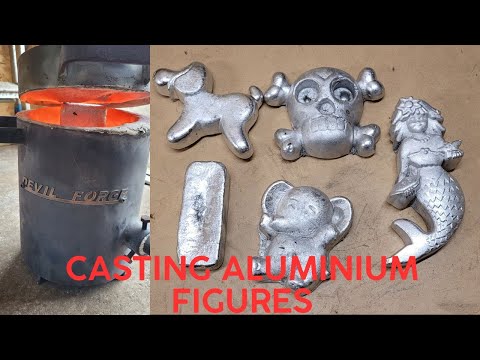Fascination About Alcast Company
Fascination About Alcast Company
Blog Article
The smart Trick of Alcast Company That Nobody is Talking About
Table of ContentsThe Greatest Guide To Alcast CompanyThe smart Trick of Alcast Company That Nobody is Talking AboutThe Alcast Company StatementsGetting My Alcast Company To WorkUnknown Facts About Alcast CompanyThe Buzz on Alcast Company
The refined difference lies in the chemical web content. Chemical Comparison of Cast Aluminum Alloys Silicon advertises castability by reducing the alloy's melting temperature and enhancing fluidness throughout spreading. It plays an essential role in allowing complex mold and mildews to be filled properly. In addition, silicon adds to the alloy's toughness and put on resistance, making it valuable in applications where resilience is essential, such as auto parts and engine components.It likewise enhances the machinability of the alloy, making it easier to process into finished products. This way, iron contributes to the overall workability of aluminum alloys. Copper enhances electrical conductivity, making it advantageous in electric applications. It additionally boosts rust resistance and contributes to the alloy's overall strength.
Manganese contributes to the toughness of aluminum alloys and enhances workability. Magnesium is a lightweight component that supplies toughness and influence resistance to aluminum alloys.
Alcast Company Fundamentals Explained
It permits the manufacturing of light-weight elements with outstanding mechanical residential properties. Zinc enhances the castability of aluminum alloys and aids control the solidification process during casting. It boosts the alloy's stamina and firmness. It is frequently discovered in applications where detailed shapes and great details are essential, such as decorative castings and specific auto parts.

The primary thermal conductivity, tensile strength, return strength, and elongation differ. Among the above alloys, A356 has the greatest thermal conductivity, and A380 and ADC12 have the least expensive.
Excitement About Alcast Company

In precision casting, 6063 is appropriate for applications where intricate geometries and top quality surface area coatings are extremely important. Examples include telecommunication rooms, where the alloy's exceptional formability enables smooth and visually pleasing styles while keeping structural stability. Similarly, in the Illumination Solutions sector, precision-cast 6063 components create elegant and efficient lights fixtures that call for intricate shapes and excellent thermal performance.
It causes a better surface area finish and better rust resistance in A360. Furthermore, the A360 shows exceptional prolongation, making it perfect for facility and thin-walled parts. In accuracy casting applications, A360 is fit for industries such as Consumer Electronics, Telecommunication, and Power Devices. Its enhanced fluidness permits intricate, high-precision elements like mobile phone cases and communication tool real estates.
Alcast Company for Beginners
Its one-of-a-kind properties make A360 an important selection for accuracy spreading in these sectors, improving item sturdiness and high quality. Light weight aluminum alloy 380, or A380, is a widely utilized spreading alloy with several distinct characteristics. It uses superb castability, making it an optimal choice for precision casting. A380 displays good fluidness when molten, ensuring complex and in-depth molds are accurately replicated.
In accuracy casting, aluminum 413 beams in the Consumer Electronic Devices and Power Devices markets. It's frequently used to craft intricate parts like smart device housings, video camera bodies, and power tool casings. Its precision is amazing, with tight tolerances approximately 0.01 mm, ensuring perfect item setting up. This alloy's superior deterioration resistance makes it an exceptional selection for exterior applications, making certain durable, durable products in the stated markets.
Not known Facts About Alcast Company
The light weight aluminum alloy you choose will considerably affect both the casting procedure and the properties of the last item. Due to the fact that of this, you must make your choice very carefully and take an enlightened strategy.
Determining one of the most suitable aluminum alloy for your application will mean weighing a broad range of attributes. These comparative alloy attributes adhere to the North American Pass Away Spreading Association's guidelines, and we've split them right into two categories. The first category addresses alloy characteristics that influence the manufacturing procedure. The 2nd covers features influencing the buildings of the last product.
A Biased View of Alcast Company
The alloy you pick for die spreading straight impacts several aspects of the spreading process, like how easy the alloy is to function with and if it view is prone to casting defects. Warm breaking, likewise recognized as solidification breaking, is a common die spreading problem for aluminum alloys that can lead to internal or surface-level splits or splits.
Certain aluminum alloys are much more at risk to hot splitting than others, and your selection needs to consider this. Another typical flaw found in the die casting of light weight aluminum is pass away soldering, which is when the actors stays with the die wall surfaces and makes ejection difficult. It can harm both the cast and the die, so you need to look for alloys with high anti-soldering residential or commercial properties.
Rust resistance, which is currently a remarkable characteristic of aluminum, can vary significantly from alloy to alloy and is an essential characteristic to think about depending upon the environmental conditions your product will be subjected to (aluminum casting manufacturer). Wear resistance is another residential property generally looked for in light weight aluminum items and can separate some alloys
Report this page